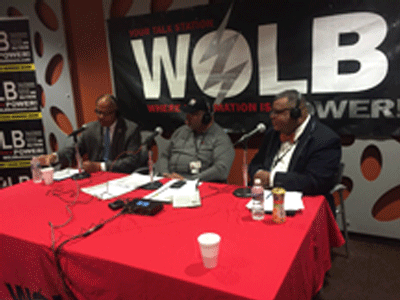WOLB 1010 AM talk show host Larry Young was joined by Maryland Lt. Governor Boyd Rutherford, to co-host a “town hall” style discussion on the causes and effects of the opioid epidemic in Maryland. The live broadcast aired Friday, Nov. 3, 2017.
Young and the Lt. Governor Rutherford were also joined by Baltimore County Department of Health and Human Services (HHS) Director Dr. Gregory Branch.
According to the National Institute on Drug Abuse (NIH), Opioids are a class of drugs that include the illegal drug heroin, synthetic opioids such as fentanyl, and pain relievers available legally by prescription, such as oxycodone (OxyContin®), hydrocodone (Vicodin®), codeine, morphine, and many others.
The NIH further notes that these drugs are chemically related and interact with opioid receptors on nerve cells in the body and brain. Opioid pain relievers are generally safe when taken for a short time and as prescribed by a doctor, but because they produce euphoria in addition to pain relief, they can be misused (taken in a different way or in a larger quantity than prescribed, or taken without a doctor’s prescription).
Regular use— even as prescribed by a doctor— can lead to dependence and, when misused, opioid pain relievers can lead to overdose incidents and deaths.
According to the Maryland Department of Health and Mental Hygiene, the state recorded 2,089 alcohol and drug intoxication deaths last year. Fentanyl and heroin are being blamed for driving the overdoses – whether Marylanders are taking only those opioids or are mixing them with other substances.
Earlier this year, Maryland Gov. Larry Hogan escalated his administration’s response to the opioid epidemic by declaring a state of emergency and committing an additional $50 million over the next five years to beef up enforcement, prevention and treatment services.
During the broadcast at Radio One, Lt. Governor Rutherford and Dr. Branch discussed strategies aimed at combating the epidemic, along with various services and programs offered throughout Baltimore County and the state. The two also fielded questions from attendees and callers.
“There is a difference between addiction and dependence,” explained Dr. Branch. “Addiction is behavior. It’s a behavior that says a person will do anything despite any type of consequences to get that drug. That person is clearly addicted. Then there are those people who are dependent. That person is not going to do anything, but they are dependent on that drug for their life.”
Dr. Branch also discussed the availability of naloxone, a life-saving drug that can reverse opioid-related overdoses.
Young, who said he was “very pleased” with the broadcast, talked about its purpose.
“I am very disappointed with President Donald Trump’s decision surrounding this problem,” said the talk show host. “We know it’s a city, county and state problem here in Maryland, but it’s also a national problem. Based on the actions of the President, I wanted to find out what the state and county were doing. As a result, the Lt. Governor and Dr. Branch were invited, and here we are today.”
Last month, President Trump directed the Department of Health and Human Services to declare the opioid crisis a public health emergency, but fell short of declaring it “a national emergency,” which many say would have prompted the rapid allocation of federal funding to address the issue.
Criticized by Democratic lawmakers and some public health advocates, who questioned the President’s commitment to the crisis, noting that Trump made no immediate request to Congress for emergency funding.
“That was very foolish,” said Young, who plans to continue the conversation.
“We are going to repeat this show and have the Lt. Governor and Dr. Branch back on,” said Young. “I would also like to include officials from Baltimore City, Anne Arundel County and Howard County. This was a great show, and a lot of helpful information went out.
